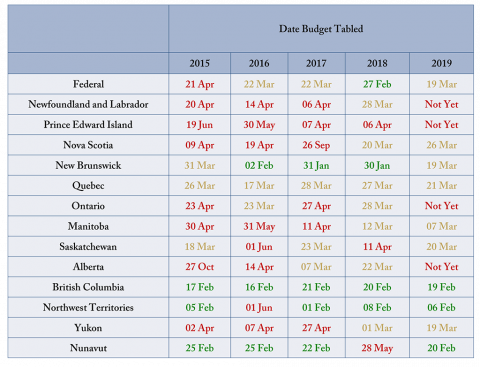To: Members of federal, provincial and territorial parliaments
From: Farah Omran and William Robson
Date: March 26, 2019
Re: Spending without Authorization – Did You See a Budget Yet?
Next Monday is April 1, which marks the beginning of the fiscal year for Canada’s federal, provincial and territorial governments. A key principle of parliamentary democracy is that governments need legislative approval to spend public money. A key link in the chain of accountability for public funds is the annual budget.
Happily, with the federal government, New Brunswick, Saskatchewan and Quebec presenting their budgets last week, and Nova Scotia presenting today, 10 of the 14 senior governments have put their plans for 2019-2020 before their legislatures prior to the start of the fiscal year. Unhappily, Newfoundland and Labrador, Prince Edward Island, Ontario and Alberta will not. In these provinces, billions of dollars will be committed and spent before legislators have seen, let alone voted on, the programs their constituents will benefit from, and pay for.
For legislative control over public money to be a reality, legislators need time to read and understand budgets. Ideally, governments would present them well before the fiscal year begins. If they arrive too close to the beginning of the fiscal year, scrutiny is perfunctory. If they arrive after the fiscal year has begun and money is already flowing, fiscal accountability is a fiction.
The gold stars for budget promptness in Canada over the past five years go to British Columbia and New Brunswick. B.C. legislation requires a budget on the third Tuesday of February, a deadline it meets. New Brunswick also has a five-year record of budgets presented before the end of March, and in 2016, 2017 and 2018, it presented before the end of February. Quebec deserves a shout-out for presenting before the end of March consistently over the past five years – though it would get a heartier one if it beat the deadline by more. The Northwest Territories deserves recognition as well: it stumbled with a June presentation in 2016, but delivered February budgets in every other year.
The budget-promptness raspberry goes to Prince Edward Island, which failed to present a budget before the fiscal year in any of the past five years, with Newfoundland and Labrador getting a dishonourable mention for having done so only once.
Encouragingly, there is a promising trend toward more timely delivery over the past five years. Colour-code budget dates with green for before the end of February, yellow for March, and red for April or later, as in the figure, and 2015 and 2016 show too much red. Only six of the 14 governments presented before March 31 in those years. In 2017, however, eight did, and last year, 11 managed it.
This year represents a setback. Ontario’s budget is due for April 11, Newfoundland and Labrador only launched its pre-budget consultations in January, and PEI in February. Alberta will have no budget until after its April 16 election – which sounds reasonable until we reflect that a province with major fiscal challenges will be operating without proper legislative scrutiny well into 2019-2020. Legislators in these provinces should demand better.
Indeed, legislators just about everywhere should demand better. Next year’s tally should show yellow – preferably green – across the country. New Brunswick presented its budget in January in 2017 and 2018, and the Northwest Territories led the pack with a February 6 presentation this year. British Columbia meets its February deadline every year.
Elected representatives in those jurisdictions have a real opportunity to examine and vote on their governments’ fiscal plans before the year begins. If they can do it, so can everyone.






